

Retaining Top Talent: Yes, It Really Is All About Them. Think back.
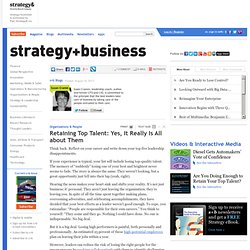
Reflect on your career and write down your top five leadership disappointments. If your experience is typical, your list will include losing top-quality talent. Xerox Tests Workforce Science from Evolv in Its Call Centers. Xerox is screening tens of thousands of applicants for low-wage jobs in its call centers using software from a startup company called Evolv that automatically compares job seekers against a computer profile of the ideal candidate.
According to these data, culled from studying job records of many similar workers, past experience working in call centers isn’t a good predictor of success. Instead, a person should be a “creative” type, though not too inquisitive. Participating in one social network like Facebook is a plus, but involvement in too many is a negative. A short commute is a must—that means a person is less likely to quit before Xerox can recoup its cost to train them. While personality exams aren’t new to business, large employers like Xerox are beginning to embrace a concept called “workforce science” that promises to make performance reviews and judging résumés far more data-driven. Lawyers who practice anti-discrimination law are watching these trends. Elliot w. eisner: what can education learn from the arts about the practice of education? Contents: introduction · the development of a technicized, cognitive culture · artistically rooted forms of intelligence · the creation of a new culture of schooling · conclusion · further reading and bibliography · links · how to cite this article see, also, elliot w. eisner, connoisseurship, criticism and the art of education.
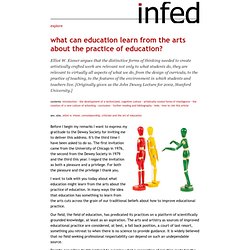
The Facebook Generation vs. the Fortune 500. The experience of growing up online will profoundly shape the workplace expectations of “Generation F” – the Facebook Generation.
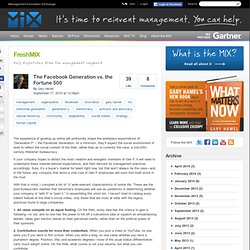
At a minimum, they’ll expect the social environment of work to reflect the social context of the Web, rather than as is currently the case, a mid-20th-century Weberian bureaucracy. If your company hopes to attract the most creative and energetic members of Gen F, it will need to understand these Internet-derived expectations, and then reinvent its management practices accordingly. Gen Y and the Future of Work. 21st Century Individuals vs. 20th Century Organizations. Generation Flux. How Facebook Finds The Best Design Talent, And Keeps Them Happy. If you take a close look at Facebook’s S-1 registration statement, you’ll notice something striking: Designers are called out as key to the company’s long-term strategic success.
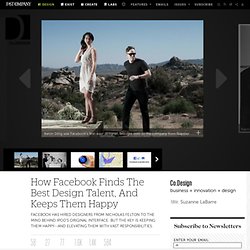
Tech company filings often call out certain job functions--like engineering--and the organization’s ability to fill those positions as crucial to its success. But designers? That’s almost unheard of. And yet, there they are. In the section titled “Factors Affecting Our Performance,” Facebook’s filing reads: “We have also made and intend to make acquisitions with the primary objective of adding software engineers, product designers, and other personnel with certain technology expertise.” The mentions underline the importance (little-noticed until now) that Facebook places on its design team.
Designing for Facebook, Cox said, gets at “the science of things you can’t reason about, that you just feel.” That mindset is only going to become increasingly important. Encouraging People To Be Owners, Not Just Employees. Re-Framing talent for our times. Talent Leader Emerging Issues. 5 Reasons Why Traditional Employment Is in Trouble. According to the U.S. Labor Department, 2.1 million people resigned their jobs in February, the most in any month since the start of the Great Recession. This is startling given that the economy is not strong and that millions are out of work. The natural inclination would seem to me to be to hunker down and hang on to the job you have, no matter how bad it is.
That is what happened in previous recessions. Yet these were disgruntled, unsatisfied, and unfulfilled people who voluntarily, many without other positions or jobs lined up, chose to leave. In discussions with some of them, I heard talk about feeling they having been used to bolster executive salaries and inflate shareholder expectations unrealistically. And with eroding benefits and the potential of better access to health care, the hold that corporations used to have is loosening. Millennials will benefit and suffer due to their hyperconnected lives. Overview of responses In a survey about the future of the internet, technology experts and stakeholders were fairly evenly split as to whether the younger generation’s always-on connection to people and information will turn out to be a net positive or a net negative by 2020.
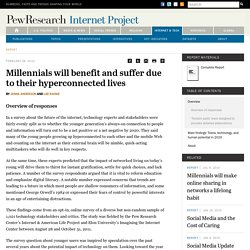
They said many of the young people growing up hyperconnected to each other and the mobile Web and counting on the internet as their external brain will be nimble, quick-acting multitaskers who will do well in key respects. At the same time, these experts predicted that the impact of networked living on today’s young will drive them to thirst for instant gratification, settle for quick choices, and lack patience. A number of the survey respondents argued that it is vital to reform education and emphasize digital literacy. Innovation and the Future Workforce: key trends for the decade ahead.